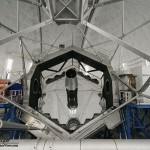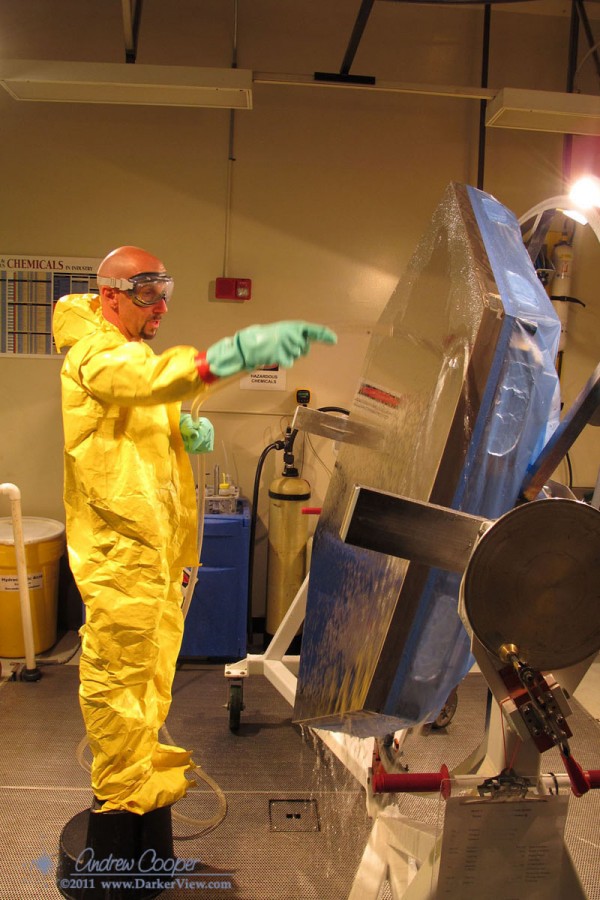
Category: Working at Keck
Working atop The Mountain
Postcard from the Summit – Cleaning a Mirror
A Construction Cam for TMT
Not a hard job, but someone has to do it… Hanging off the weather tower again. This time all I am doing is taking pictures!
Paul and Fred from the the TMT telescope are walking the perimeter of the TMT site with a large white pole. At a few preset points they call me on the radio and I snap a couple photos. I spend the few minutes between each location just enjoying the view, or adjusting the climbing harness to find a less uncomfortable pose. At least the weather is quite nice.

The camera will most likely be mounted on the Keck weather mast. The location offers power and communications along with a secure mounting point. What we learn is good news, from the mast there is a clear view of the complete TMT building site
What remains to be done is the paperwork. First we must seek and receive approval from the Office of Mauna Kea Management. Any changes to the outside of any of the facilities must be approved before work begins. I have done this in the past whenever I modify one of the weather instruments. Usually not a major hurdle, but one that must be done right.
I have supported the TMT in a number of small ways. It will be exciting to watch the construction, we have a ringside seat at Keck!
Postcard from the Summit – Testing
Getting to the Summit
I wish it were this easy! Our summit crew is having way too much fun on a holiday.
At least I do not have to go up today, I am just on-call over the holiday weekend.
VLBA Aimed South
So I check the Mauna Kea webcams. The VLBA antenna? Aimed South?

NPR Segment on Keck Adaptive Optics
A nice NPR piece on Keck AO today. A decent discussion of the history and advantages of adaptive optics.
For Sharpest Views, Scope The Sky With Quick-Change Mirrors
It used to be that if astronomers wanted to get rid of the blurring effects of the atmosphere, they had to put their telescopes in space. But a technology called adaptive optics has changed all that.
Always a good thing when a system I put so much of my life into receives some good press!

Employment Opprtunity at Keck – Student Assistant Systems Administrator
W. M. Keck Observatory position announcement…
The Observatory seeks a Student Assistant to support the Computer System Administrator on a variety of computer software/hardware oriented assignments.

- Hardware and software data entry.
- Windows computer software/hardware configuration/troubleshooting
- Tape organizing.
- Shipping and Receiving support.
- Network Table data entry.
- Assist as primary help desk for Systems Administration group.
- Work effectively with coworkers and others by sharing ideas in a constructive, positive manner; listening to and objectively considering ideas and suggestions from others; keeping commitments; keeping others informed of work progress and issues; addressing problems and issues constructively to find mutually acceptable and practical solutions; and respecting the diversity of the WMKO workforce in actions, words, and deeds.
- Maintain commitment to a high standard of safety, comply with all safety laws and WMKO safety policies/rules, and report actual and potential safety violations to appropriate supervisory or management personnel to further WMKO’s core value of safety.
Continue reading “Employment Opprtunity at Keck – Student Assistant Systems Administrator”
Postcard from the Summit – Test Leads
Sticky Worm
It began, as all these things do, with a phone call from Liz…
“It’s stuck”
“What is stuck?”
“SFP won’t move in K2AO.”
“Do not try to move it any further, I am up tomorrow for SegEx, I will go look at it.”

SFP is different, it can crash into the rotator if it gets lost. There is no real way to fix this issue, it has to be this way. SFP stands for Simulator Fiber Positioner, an artificial star created with a optical fiber. Placing the tip of the fiber at the telescope focus creates a bright dot of light that we can use to align and calibrate the AO system. The three axis stage can move the fiber into the light path and accurately position it just where you need it for system tests. There is also a diagonal mirror used to inject light from the telescope simulator and the spectral calibration source mounted atop the simulator.



